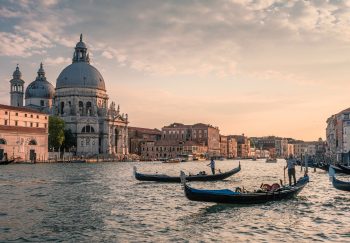It is my goal to help you plan your perfect Italy trip with the articles I write for Italy Explained. However, this month’s Italy Roundtable topic COMMUNITY has me reflecting back on a Milan experience that I had many years ago.
This is something I have never written about because it was a difficult cross cultural moment and I still don’t know how to get my head around it all these years later.
I’m sorry for this little introspection. I’d love to hear your thoughts about what you might do in my place.
Jeff Kubina, creative commons photo
The Italian woman across from me said, “Non mi piacciono…i musulmani.” I was frozen.
Muslims are not my favorite.
My language skills at the time were not sufficient to make small talk over dinner. I could only handle topics that involved travel, food, or my profession. After we finished sipping our barbajada, my hostess had moved us into the realms of religion and politics. I found it difficult to make a contribution. Particularly because I arrived in her loft apartment just hours earlier as a stranger.
I read about the Home Food organization months prior to my trip to Italy. I knew immediately that I wanted a dinner with them. My ex-girlfriend and I had already planned a trip for Milan. We checked the Home Food Dinners list as soon as we booked our apartment and flights. We reserved two places because there was only one available on the calendar.
Although the listing stated that the couple could only host six diners, this was November in Milan. We were therefore surprised to discover that we were the only ones there that evening.
We found that we had lots to talk about with our hosts, a well-travelled couple who speak excellent English. Their living room featured bookshelves from floor to ceiling. Several rows contained travel guides from all over the globe. They shared their recent trip to Hawaii and we talked about our travels.
They found out that we spoke Italian and decided to practice it. This didn’t cause much trouble for the majority of the evening, except for my growing translation headache. My ex and hostess had a conversation about cars somewhere between the osso Buco and the panettone. The hostess and me rolled our eyes and talked about other topics.
I don’t recall what prompted the conversation to shift from mundane topics like food and travel to more serious subjects such as politics and religion. Nearly eight years later, the only part of the evening that I can still recall is the moment when my hostess looked directly into my eyes and said, “Non piacciono…i musulmani” as if she were just – but firmly – telling you she doesn’t like brussel sprouts.
The concept of “community,” is something I often think about. At different times in my life I have worked in community management both online and offline. All of us want to find our tribe, those with whom we feel comfortable, and who we can trust. Different reasons may lead us to gravitate towards different groups, but as long there is one thing that unites us, it can create a strong sense of community. This can allow individuals to be free to say and think things that they don’t normally feel comfortable with. A community’s strength is its numbers.
Italy is a country where community is more visible than in the United States. There are neighbors who sit on the front steps and have long conversations, and shopkeepers who get to know their customers. After a long stay in Milan, I received a “il solito?” and a nod from the man at the corner coffee shop where I had my morning coffee. It was the act of putting words into community, him remembering my order each day and asking me if I would like “the usual.” This is what made me feel so proud of my loyalty to that bar (never mind that the proprietor doesn’t know who I am).
However, the power of community can also have a dark side. A group is bound by one thing that all members agree on. This means that any member who disagrees with the group will be excluded and even ridiculed. It is possible for “us” to exist without a “them”; just watch travelers debate “window seat” or “aisle chair” and you will see what I mean. However, it can also be dangerous.
Even before the night in Milan, I knew that Italians are patriotic. Not necessarily about Italy but about the region or town where they were born. It’s still sweet and sometimes silly to me. My town’s recipe is better than the one from three miles away. It was that loyalty to one’s community, one’s home, can lead to xenophobia.
Our hosts spoke most of the evening. I was doing a lot more nodding as the night progressed and my translation headache kicked into high gear. “Non piacciono, i musulmani” was what I thought it meant. I didn’t nod. I stared at her. It wasn’t an error. She went on about why she didn’t like Muslims without blinking an eye. My brain was reeling. We finished our meal and thanked our hosts.
I was unable to speak the language to answer my hostess’s questions that night at dinner. But, I wonder if I would have been brave enough to challenge her views in her country, her home. Although I wish I could say that I would have the courage, I don’t really know.
Over the years, I’ve read many stories about minorities being beat in Italian cities, black soccer players getting beaten, and an not insignificant political party in Italy which basically has mistrust for all non-Italians (some might even call it outright racism). There is an entire Wikipedia article on “racism” in Italy. It would be foolish for me to attack Italy on this topic when, for example, black people are being murdered by police in my country with alarming regularity. It is not the only country with problems related to racism or religious intolerance.
I will accept that there is no utopia, and that no one is perfect. I will argue that “community” is not by definition a positive thing. See the Ku Klux Klan for evidence. After that night in Milan I will admit that these two aspects of Italian community – the blinders-on belief that a neighboring village might have a good recipe for one of your favorite dishes and the Italian Senate declaring it’s not racist comparing black people to – may be two sides to the same coin.
Italy Roundtable: Other Voices
What is my fellow Italy Roundtable members discussing this month? Follow me to each post. Please leave comments and share with your friends. Tune in next month to see another topic on Italy Blogging Roundtable!
- ArtTrav Florence’s expat community
- Home in Tuscany Why you should choose to spend your vacation in small communities
- Brigolante – Partytime at Assisi’s Calendimaggio
- Driving like a Maniac It takes an entire village
- Italofile Rome, Communing over Coffee
Are we connected?
Have you LIKED us on Facebook? Are you following our Twitter? We’re very friendly, so please drop by to say hello. We are always open to suggestions for future topics for the Italy Blogger Roundtable. Drop us a message on Facebook, Twitter, or comment on any of our posts.











